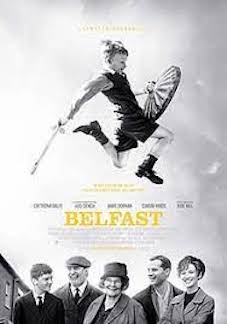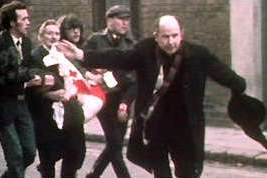Film: Belfast

Recent nominations for six BAFTAs suggest that 'Belfast' is on its way to becoming a multi-award-winning film. I was excited to see it because my mother was from Northern Ireland and in the 60s and 70s my family spent our summers there, and that included trips to Belfast. Coming from London, we loved our visits, especially touching base with the extended family and the beautiful countryside.
'Belfast' presents a glimpse of life in working-class Belfast in mid-August 1969 through the eyes of writer and director Kenneth Branagh, who was raised there until the age of nine. The movie is partly autobiographical as we follow young Buddy (newcomer Jude Hill) and his parents, Pa and Ma, (Jamie Dornan, Caitriona Balfe) and grandparents, Pop and Granny (Ciaran Hinds, Judi Dench) dealing with family life as their neighbourhood explodes in sectarian violence.
The film portrays the upheavals of that summer of 1969. Suddenly the family's street of largely Protestant families is overrun by rioters who force Catholic families from their homes. Within days the street resembles a war zone with barricades at both ends. Buddy's father and older brother are pressured to join in the developing gang culture and sectarianism. Pa gets bullied by local thug Billy Clanton (Colin Morgan) to join in "cleansing" the community, but he resists.
The great strength of the film is the quality of the acting as family relationships are put under pressure. Much is seen through the eyes of Buddy. The threat of violence can be around every corner, but Buddy still plays with friends, goes to school, develops a crush, and tries to impress older relatives. Jude Hill is the gifted child actor at the centre of the film. He even holds his own with 'grandparents' who are acting giants. When Judi Dench talks with her grandson about a film she loves centred on Shangri-La, a paradise on Earth, Buddy asks whether she has even been there. She responds - in a perfect Belfast accent - that, "there are no roads to Shangri-la in our part of Belfast."
However, the parents begin to consider a new road, namely moving to England, where Pa is already a migrant worker. But they fear missing their community in Belfast "where everybody knows you." 'Belfast' depicts the central family with much tenderness and celebrates community. "There is no 'our side' and 'their side' on our street" says his father "there didn't used to be anyway."
The film took me back 50 years. Filmed in black and white, the family huddles in front of the home's one black and white television, as my own family did in the 60s, watching such programmes as 'Thunderbirds' and movies such as Zimmerman's 'High Noon'. This was clearly shown because it echoes the standoff between the family and those around them being drawn into violence. There was no 'record' on televisions then so you only had only one chance of seeing a favourite programme. We see family members being thrilled on an outing to the cinema when Chitty Chitty Bang Bang takes flight. The film's soundtrack is filled with songs from Belfast-born musician Van Morrison. The opening 'Down to Joy', which was created specifically for the film, talks of a dream bringing back a time of joy, clearly the way Branagh remembers his early childhood in Belfast.
I loved such gems as Granny doubting the moon landing of July 1969, just as my own granny did, the flirty conversations between grandparents who've been together for decades, the tinkering grandfather who gives time to engage with his grandchild. In fact, the intergenerational chats between Buddy and both grandparents are truly charming. There was undoubtedly more family conversations in an age without the distractions of mobile phones and computers, and in tiny homes with little space for the family to spread out into separate rooms with separate amusements. And everybody shared the one outside toilet!
Yet, I was surprised that the film doesn't offer much insight into a turbulent time. The Troubles are merely a backdrop to the impact of upheaval on the central family and the perspective is from child Buddy, that is the child Kenneth Branagh. I was disappointed because that is what I had been expecting from a film titled 'Belfast' and set in 1969.
That may come from my own memories of Belfast. On the evening of 14 August 1969, my mother, aunt and myself took the bus from the Southern Ards Peninsula to meet up with relatives for bingo in Belfast's Andersonstown. We heard on the radio that tensions were high in Belfast, but we set out anyway. When we arrived in the Falls Road area in the early evening they urged us to return immediately to the bus station. It was getting dark and I remember hurrying past bonfires and groups of menacing young men gathering on the street corners. Petrol bombs were being assembled and barricades erected. The atmosphere was smoky and belligerent. We were so grateful to get away safely from the images and smells of violence. Back in the countryside a few hours later, we could see the sky above Belfast orange in the distance. That night, as a teenager, I first became aware of 'the Troubles'. And it was in those days - as Branagh has recalled in interviews - that rioters came into his street and attacked Catholic homes.
The impact of conflict on communities is highlighted but the more complex context is hardly explored. Those summer months of 1969 saw some of the worst violence in Northern Ireland's history, after a fierce crackdown by the authorities on the largely Catholic Civil Rights movement in the province. On 15 August the UK Prime Minister, Harold Wilson, ordered the British Army into Belfast. At one stage in the film Pa tells his son, "bloody religion - that's the problem." Not entirely, in my view. Many commentators over the years have described The Troubles as not so much a religious war but a political and economic conflict with religious overtones.
Branagh does touch on those religious overtones. The religious jokes are mostly at the expense of the family's Protestant preconceptions. "I've nothing against Catholics, but it's a religion of fear," someone says. We then cut straight to a non-conformist minister yelling about an "eternal pit of suffering".
The set of the terraced-street in North Belfast was actually constructed in Hampshire where much of the filming took place. This was partly because of Covid restrictions, but also because many of those fiery streets of 1969 no longer exist. Even in the 1970s the Belfast of the poorer areas that I knew was full of open spaces and car parks after whole blocks were demolished. The set does seem a bit contrived and there are a few other aspects for me which don't seem to be fully authentic: Pa seems to be returning from England very regularly at weekends. The migrants in my family couldn't do that because of the distance - it was largely a boat/train journey from England in those days - and expense. Buddy's crush on a Catholic classmate seems odd to me because schools were generally religiously segregated. The family's street is not criss-crossed with Union Jack flags, as I remember in Protestant areas, and the women aren't endlessly producing soda bread and tarts, which I remember very fondly.
However, there is much to applaud in this film: the depiction of love within a family, including the extended family, and in the context of upheaval. Branagh says himself, "I hope that there is humour and I hope that it's emotional; it's a look at a people and a place in tumult through the eyes of a nine-year old movie-mad kid."
'Belfast' is imbued with an idealised wistfulness fitting for someone who is telling a story about a home he left in childhood. Branagh says that lockdown during the pandemic gave him plenty of time to reflect on his childhood - the good times as well as the bad. 'Belfast' has certainly prompted similar reflections for many, particularly those with similar roots.
Watch the official trailer here: www.youtube.com/watch?v=pSNo3MBzd20


















